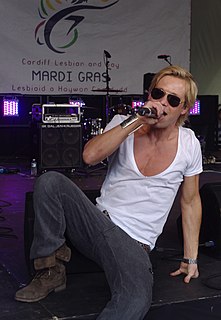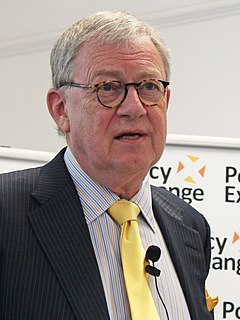A Quote by Edward Kennedy
People of faith should not invoke the power of the state to decide what everyone can believe or think or read or do. In such cases, like abortion or prayer or prohibition or sexual identity, the proper role of religion is to appeal to the free conscience of each person, not the coercive rule of secular law.
Related Quotes
The real transgression occurs when religion wants government to tell citizens how to live uniquely personal parts of their lives. The failure of Prohibition proves the futility of such an attempt when a majority or even a substantial minority happens to disagree. Some questions may be inherently individual ones, or people may be sharply divided about whether they are. In such cases, like Prohibition and abortion, the proper role of religion is to appeal to the conscience of the individual, not the coercive power of the state.
There are many, many discrepant views within the Shia theology about what's the proper role of religion in society or in the State, should it rule now, should it claim to govern people in the here and now, or should it wait until the Messiah, the 12th Imam, comes back and would it only be then appropriate for religious rule to bring about a world of universal justice and vindication.
A well-regulated militia, composed of the body of the people, trained to arms, is the proper, natural, and safe defense of a free state; that standing armies, in time of peace, should be avoided as dangerous to liberty; and that in all cases the military should be under strict subordination to, and governed by, the civil power.
I believe in absolute freedom of conscience for all men and equality of all churches, all sects and all beliefs before the law as a matter of right and not as a matter of favor. I believe in the absolute separation of church and state and in the strict enforcement of the Constitution that Congress shall make no law respecting an establishment of religion or prohibiting the free exercise thereof I believe that no tribunal of any church has any power to make any decree of any force in the law of the land, other than to establish the status of its own communicants within its own church.
Too many people in America believe that if you are pro-choice that means pro-abortion. It doesn't. I don't want abortion. Abortion should be the rarest thing in the world. I am actually personally opposed to abortion. But I don't believe that I have a right to take what is an article of faith to me and legislate it to other people. That's not how it works in America.
When two men of science disagree, they do not invoke the secular arm; they wait for further evidence to decide the issue, because, as men of science, they know that neither is infallible. But when two theologians differ, since there is no criteria to which either can appeal, there is nothing for it but mutual hatred and an open or covert appeal to force.
Obama's attitude toward the rule of law is apparent in the words he used to describe what he is looking for in a nominee to replace Justice David Souter. He wants 'someone who understands justice is not just about some abstract legal theory,' he said, but someone who has 'empathy.' In other words, judges should decide cases so that the right people win, not according to the rule of law.
We in the United States, above all, must remember that lesson, for we were founded as a nation of openness to people of all beliefs. And so we must remain. Our very unity has been strengthened by our pluralism. We establish no religion in this country, we command no worship, we mandate no belief, nor will we ever. Church and state are, and must remain, separate. All are free to believe or not believe, all are free to practice a faith or not, and those who believe are free, and should be free, to speak of and act on their belief.
The safest way for a state is to lay down the rule that religion is comprised solely in the exercise of charity and justice, and that the rights of rulers in sacred, no less than in secular matters, should merely have to do with actions, but that every man should think what he likes and say what he thinks.
I had to audition for Fandango. When I read the script, the role that was interesting - so everyone thought - was the role that Costner played. He was the cool guy. And I read the script, and my representation at the time said, "That's the role you should read for." And I was like, "Really? How about I read for this other role." And they went, "Well, you're not going to get that role."
My theory is that everything went to hell with Prohibition, because it was a law nobody could obey. So the whole concept of the rule of law was corrupted at that moment. Then came Vietnam, and marijuana, which clearly shouldn't be illegal, but is. If you go to jail for ten years in Texas when you light up a joint, who are you? You're a lawbreaker. It's just like Prohibition was. When people accept breaking the law as normal, something happens to the whole society, you see?
Religion is a personal, private matter and parents, not public school officials, should decide their children's religious training. We should not have teacher-led prayers in public schools, and school officials should never favor one religion over another, or favor religion over no religion (or vice versa). I also believe that schools should not restrict students' religious liberties. The free exercise of faith is the fundamental right of every American, and that right doesn't stop at the schoolhouse door.
































